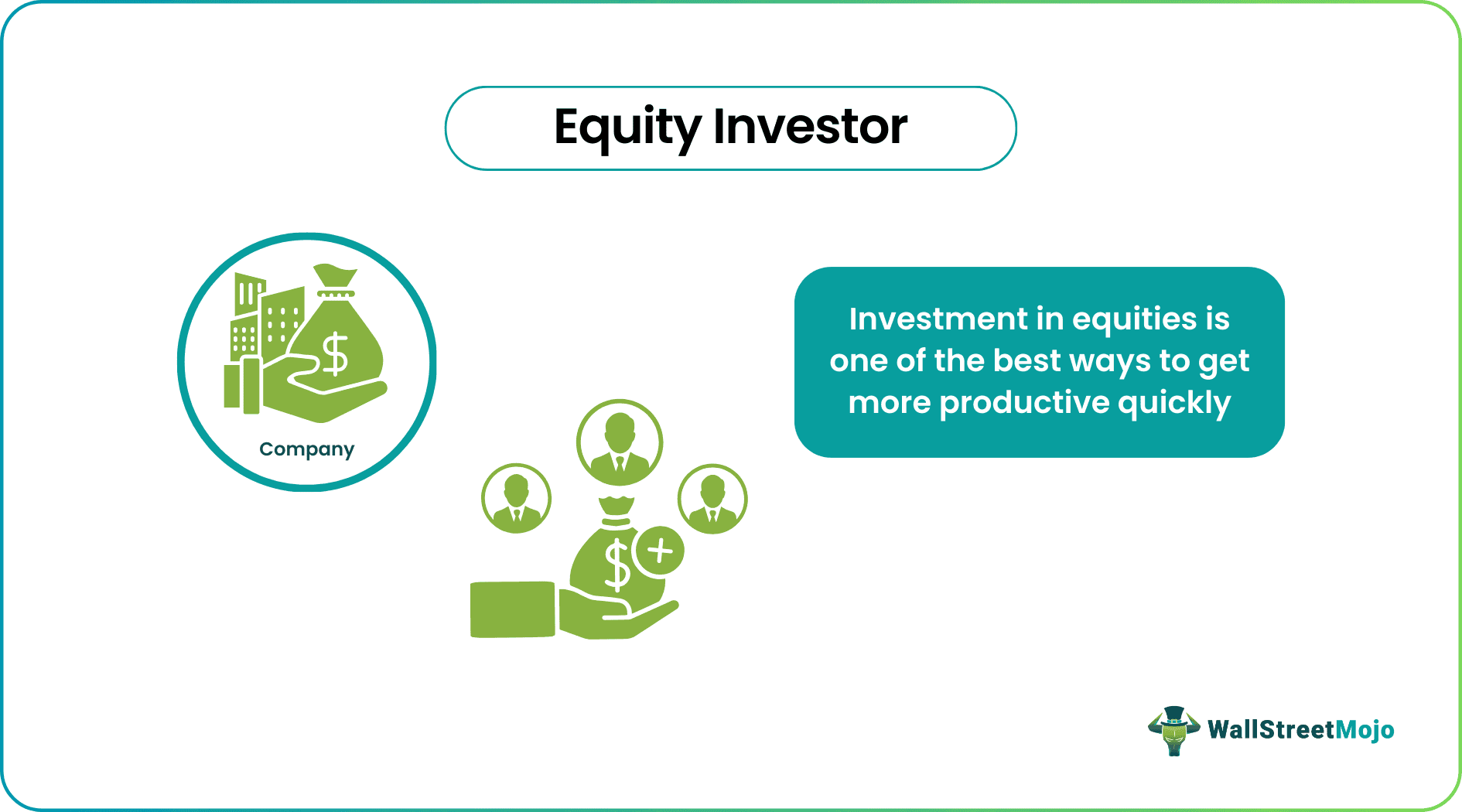Table Of Contents
What is an Equity Investor?
Equity investors are investors (retail or institutional investors) invested in a company (whether publicly or privately held) to achieve a financial gain or return via capital appreciation, dividend payments, the addition of shares, etc., usually for a substantial period.

Key Takeaways
- Equity investors are investors (retail or institutional investors) that invest in a company (whether publicly or privately held) to obtain a financial gain or return through capital appreciation, dividend payments, the addition of shares, etc.
- Equity investment also requires a strong discipline over the investment life.
- It is an excellent passive income source if one knows that the business and equity markets allot weekly. It can earn a heavy return over time and additional benefits like dividends and capital appreciation.
Explanation
Unlike a trader, an equity investor invests in a corporation's inequities for an extended period. Investment in a share is for a target that generally surpasses the yearly barriers. Earning a large amount of wealth from investing in equity requires the company to expand and achieve its potential, which requires an extended time. If you put money for a longer period and the company’s business flourishes expectedly, typically, these stocks provide decent returns.
Risks of Equity Investor
- Investing in a stock does not guarantee any returns. On the contrary, the amount financed could deteriorate or lose value in adverse scenarios such as management frauds, unfavorable financial environment, and many more.
- Again, equity shareholders would be the last to receive their proportion in the entity's liquidation. This situation makes the shares locked, and it is tough to sell them out while the process continues. So, the major thrust has to be absorbed by equity holders. But, with the help of intense research and understanding of the industry situations, we can avert these unfavorable scenarios in the early period.
- Retail investors, or small investors, are up against the big organizations, financial entities, and large investors in terms of knowledge and reach about the information and resources. Information is a crucial factor in the stock market, and big investors have reliable contacts with management, heavy software, and expert staff to remain aware of any unwanted situation. But retail or small investors face severe challenges compared to organized investors. As a result, retail investors only rely upon the information in the public domain.
Responsibilities
The market is flooded with success stories of long-term stockholders, but not all the stories are the same. The stock market is widely infamous for its volatility and punishments. So, it is not an easy task to earn handsomely at all times. Nevertheless, the following are a few pointers that could increase the chances of success in the equity world.
- To excel in the world of the equity market, the investor should possess at least an elementary knowledge of the business and the industry to which the company belongs. In addition, he must be aware of the prevalent conditions in the industry and company, respectively, to have a rough idea about the upcoming situation and its impact on the company.
- Good or workable knowledge of the financial terms and a detective mindset would help an investor understand the quantitative side and evaluate its competitors fairly. In addition, a good investor with strong expertise in finance would be in a better position to track down the organization's frauds or declining conditions by reviewing company statements.
- Equity investment also demands a strong discipline over the life of the investment. Various circumstances would arise when it would not be easy to remain invested in the stock. Most holders could not make it to the list of great earners because sometimes they lose courage or faith in their earlier evaluation. Hefty returns take time to build, so an investor should remain invested for a substantial period.
Benefits
- Investment in equities is one of the best ways to increase productivity quickly. We all have heard multiple stories of people becoming millionaires and billionaires just sitting on the stock for years.
- If held for years, equity investments in a pleasant environment could provide capital appreciation return along with other short-term and financial benefits such as dividends, stock rights, bonuses, etc.
- It is an excellent source of passive income; if the person knows business and equity markets devote a short time weekly, they could earn a hefty return over time. Also, the additional benefits such as dividends and other resources are the capital appreciation.
Conclusion
Overall, the equity investor faces substantial challenges over holding a security period. Still, even one successful stock pick over the years could give the investor a healthy return, and history has shown many such examples of these returns.
